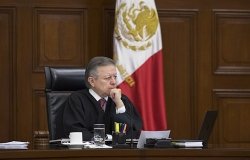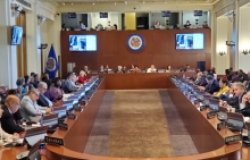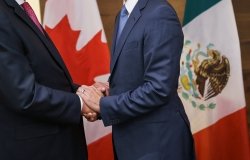Argentina-US Bilateral Relations: An historical perspective and future challenges II
The Woodrow Wilson Center's Latin American Program and the Center for Legal and Social Studies, an Argentine human rights NGO, co-sponsored this conference at the Law School of the University of Buenos Aires in Argentina.
Overview
Participants:
John Dinges, School of Journalism, University of Columbia
Carlos Osorio, National Security Archive
Horacio Verbistky, Center for Legal and Social Studies (CELS)
Ariel Armony, Colby College
Cynthia Arnson, WWICS
Agustín Colombo Sierra, Argentine Foreign Ministry
Roberto Russell, Torcuato Di Tella University
Mark Falcoff, American Enterprise Institute
Diana Tussie, FLACSO-Argentina
Rut Diamint, Torcuato Di Tella University/WWICS
The first panel examined recently-declassified U.S. documents about U.S.-Argentine relations during the 1970s dirty war. John Dinges underscored the complexity of U.S. policymaking during the period, in which democratic values and an interest in human rights clashed head-on with U.S. arrogance and a tolerance of repression. He noted a newly declassified document obtained by the National Security Archive as well as other evidence indicating that then-Secretary of State Henry Kissinger supported and encouraged the repression being carried out by the military government, issuing a series of "green lights" that served to undermine other officials pressing for human rights improvements. Carlos Osorio focused on Carter's human rights policy, evaluating its effectiveness. While noting inconsistencies, including the tension between condemning human rights abuses and seeking improvements through a rapprochement with the military regime, Osorio concluded that Carter's policies helped save at least 100 hundred lives, according to information in the documents. He also pointed out the role of the U.S. Embassy in protecting human rights activists. Horacio Verbitsky emphasized Argentine responsibility for what happened during the years of the dictatorship. In many ways, he said, the newly declassified documents confirm what has long been known or assumed in Argentina—that the United States was fully aware of the human rights abuses of the Argentine military. He concurred with Osorio that the change in U.S. policy under Carter was helpful, especially in pressing for a visit of the Inter-American Commission on Human Rights. As a result of that visit, international knowledge of what was taking place in Argentina expanded. Verbitsky called for an Argentine version of the U.S. Freedom of Information Act, which would allow access to information in hands of security agencies. Ariel Armony focused not on U.S. policy but on the ways that the documents shed light on the role of Argentines during the dictatorship. He looked in particular at the role of peronistas, the Catholic Church, and the media, showing important levels of toleration and even support for the methods of the government in combating terrorism. Armony concluded that the documents should prompt introspection into the responsibility of Argentine politicians and civil society for the excesses of the dirty war.
The second panel focused on contemporary U.S.-Argentine bilateral relations and the foreign policy of Argentine President Néstor Kirchner. Agustín Colombo Sierra identified common interests between the Bush and Kirchner administrations, including the fights against terrorism, narcotrafficking, and the proliferation of arms of mass destruction. Both countries also participate in international peacekeeping operations and share a commitment to the liberalization of international trade, although they have pursued different strategies in this latter regard. Nevertheless, there are important differences between the two countries, evident most prominently in the importance Argentina attaches to multilateralism in world affairs and to the role of the United Nations. Roberto Russell identified as Argentina's main foreign policy challenge the establishment of credibility. The United States considers Argentina strategically irrelevant, and thus pays little attention to it. Argentina must face the fact that it is less and less important to U.S. interests and that common areas of interest are ever smaller. Mark Falcoff argued that the United States and Argentina are neither friends nor allies, nor are they likely to be in the near future. Quoting former President Raúl Alfonsín, Falcoff noted that the United States and Argentina had common interests, different interests, and contradictory interests, and the main challenge was to identify which was which. Still, he said, the country's basic problems were unrelated to its international alignments and depended more on economic growth and effective governance. Diana Tussie reiterated that neither Argentina nor Latin America as a whole is important to the United States. She explained Kirchner's foreign policy in terms of domestic politics. Kirchner became president with only 22 percent of the votes, anti-U.S. feeling in the country runs high, and discontent with neo-liberal policies is widespread. Kirchner's foreign policy takes account of this reality, avoiding policies that are costly internally while still finding some common ground with the United States.
Thank you for your interest in this event. Please send any feedback or questions to our Events staff.










